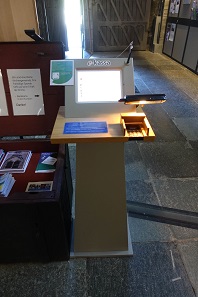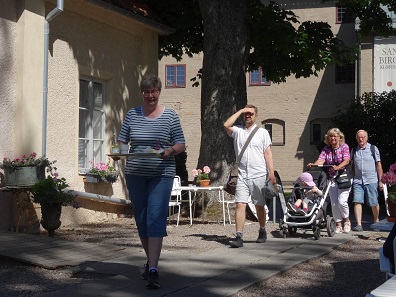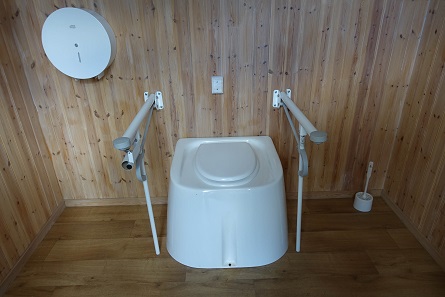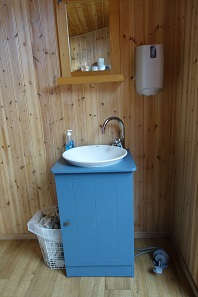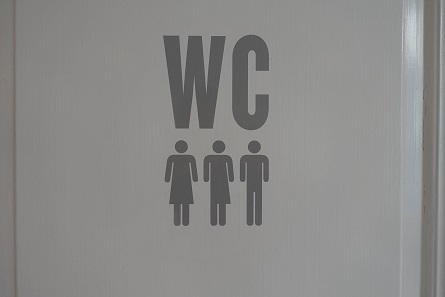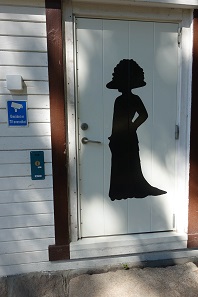translated by Almuth Klingner
It is hot in the Swedish town of Vadstena. The queue in front of the ice-cream parlor is getting longer and longer. Not because the three vendors are unable to keep up with the run for ice-cream. No, it’s because, in all of Sweden, there is a tiny little temporary problem with card payments. People are working on it, it should be solved any minute now. And while somewhere in the black box subservient spirits work on fixing the issue, two to three dozen people in a Swedish holiday town are waiting (more or less) patiently in a queue because they don’t have the necessary cash to pay for their ice-cream. We do have banknotes and thus are allowed to skip the queue. When we hand our 100 kronor (= 10 euros) to the vendor, she sighs: “There is just not enough cash out here in the province.”
In Vadstena, one is asked for a donation even in German. If you don’t have small change, you’re welcome to donate a larger amount by credit card. Photo: KW.
And in fact, that is the crux of the matter as far as the cashless society is concerned. It is not about the Swedish people’s willingness to pay cash or by card – they mostly don’t have a choice, since ATMs are rare. And nobody feels a need to become active when one of the machines runs out of money to distribute. As we heard from a reliable source: In the international university town of Uppsala, only the third ATM gave out the necessary bills, after a great number of kilometers driven by car on the search for cash. The first machine was being serviced, the second one was waiting to be refilled.
Even I, fervent advocate of cash, was driven towards paying even the smallest amounts by card by the uncertainty about when I would next be able to restock my cash reserve. Because especially for tourists, it is hard to get cash once you leave the southern coast of Sweden which is frequently visited by Germans. There, the tourists’ money is happily accepted, no matter in which form. But once you venture into areas where mostly Swedes go on holiday, you will spend quite some time looking for an exchange office. They do exist, but well hidden, and finding them does take its time.
Whether it’s out of convenience or because of this (artificial) shortage of cash, people in Sweden nowadays are used to paying even the smallest amounts by card. Therefore, money circulation has been continuously declining, as Stefan Ingves, president of the Sveriges Riksbank, announced in March 2018. From 112 billion Swedish kronor in 2007, it has fallen to 50 billion today.
On a quest around the topic of acceptance
If you want to understand why the Swedes accept that without simply switching to a different bank with a better service (which, in Sweden, would have to be founded first), you need to take a closer look at Swedish mentality.
Join us on a quest in everyday life in Sweden. By three examples – hotels, pharmacies and environmental awareness – we demonstrate the widespread Swedish readiness to accept provisions (by the economy or the government).
In the café of the four-star monastery hotel in Vadstena, you naturally get your coffee and cake yourself. The bar is serviced, but only if you call a waiter via bell. Photo: KW.
Everything for the sake of the profit
When staying in a Swedish hotel for the first time, you’re utterly surprised by the bad service. Don’t get me wrong. The people at the reception and the service staff are friendly, no doubt about it, but even they can’t change the fact that, during peak checkout time, only one single person is scheduled to work at the reception desk, because a large hotel chain like Scandic – which operates its hotels mostly in the northern area – uses long waiting times at checkout to push their clients towards checking out online.
Everything is organized for the sake of utility – the hotel’s, not the client’s, obviously: If you need a taxi, use the taxi app yourself, on an iPad specifically installed for that purpose at the reception desk. When booking online, you save up to 30%, but first you have to register with Scandic and implement Scandic’s payment system with your bank. Yes, they even try to avoid the daily cleaning of the rooms. Scandic currently offers clients a food voucher of small euro amounts for waiving that service.
It goes without saying that, at Scandic, you cannot pay cash anywhere. The hotel saves the costs incurred by using cash. But, that rule is broken as soon as business is threatened. On the southern coast of Sweden, where there are plenty of other hotels gladly accepting their clients’ coins and bills, even Scandic takes cash without further ado.
Hotels with youth hostel’s appeal
But wherever competition is low, the hotel dictates its conditions and the service needs some getting used to. One example: We all know breakfast buffets. But Sweden has optimized the system: Even in many four-star establishments, it is expected of you to take back your breakfast dishes yourself and clean up your table for the next guest. It’s all a matter of habit: During our stay, we found one(!) single café where you were served at your table. Even many restaurants are based on self-service.
If you go to a first-class Swedish restaurant, you are served, but you cannot pick out your own table. And it’s not like in the US, where the staff are happy to meet their guests’ wishes. In Sweden, efficiency has top priority: A party of two is seated at tiny two-person tables. Only when all two-person tables are occupied, the larger four-person tables become available. And this procedure applies even when the restaurant is empty. Any objection surprises and overwhelms the service staff. They just don’t know how to deal with that since it happens so rarely.
On the ferry from Visby to Nynäshamn, a drug machine offers medicine for hoarseness, fever and seasickness. Photo: KW.
Drugs at the supermarket
From the demands upon hotel guests, let’s jump to the healthcare system: From a German point of view, Sweden is still regarded as the land of milk and honey, where the citizens’ every need is cared for in an exemplary manner. But if you get (slightly) sick in this country and you go looking for a pharmacy, you realize how hard it must be for the average Swede to buy medicine. In no other country have I seen such a low concentration of pharmacies, and even in densely populated areas at that. Visby for example – an extraordinary tourist hub – has no more than two pharmacies.
There are several ways to solve that problem. For one, there is a drug machine on the ferry, where you can get pills and remedies against the most common ailments prescription-free. In many supermarkets as well, you can find a drug shelf in the checkout area. Any advice on what to take? No. Everyone is responsible for themselves.
Opulent pharmacies like this one in Malmö are much too rare in the entire country. Photo: KW.
Efforts of the Swedish government
Keep in mind that, for our little self-experiment, we only visited the “densely populated” southern third of Sweden. Further north it is even worse. Even the Swedish government had to admit that and, in 2009, reformed the pharmacy regulations, fulfilling the law saying that every Swedish citizen has to be able to get their medicine within 24 hours.
The state monopoly, with which in theory each pharmacy catered to the needs of 10,000 citizens, was liberalized. For comparison: In Germany in 2017, there was statistically one pharmacy for every 4,166 people. Even after privatization, Sweden is far from that number. A private pharmacy is now responsible for about 7,000 citizens. However, this development has not been to the benefit of the country’s scarcely-populated north, where hardly any new pharmacies were opened at all.
And of course, the 24 hours still cannot be observed everywhere, even though by now, almost 90% of all prescriptions are digitally transferred directly from the physician to the pharmacy.
Thus, it is no surprise that hardly any Swede complains about a lack of ATMs, considering they have to accept that, despite legal requirements, in large parts of the country even vital medicine cannot be supplied within 24 hours.
Water-saving, accessible for the handicapped, and clean – an example of a public toilet in Gotland. Photo: KW.
Everything for the sake of the environment
Every green politician would rejoice at how Sweden implements the requirements regarding environmental protection. All hotels are enthusiastically saving water. Special water-saving showers are installed everywhere, making washing one’s hair a time-consuming procedure for everyone with long or thick hair.
When moving into your holiday cottage, you not only receive a richly illustrated 8-page brochure in three languages about how to clean the house upon leaving it (clean the windows, mop the floors and dedicate specific attention to the bathroom). There is also a list, again multilingual, of measures to save water. It is written in the imperative, so you would have to have quite some amount of civil disobedience if you were to quickly rinse your plate under running water.
Along the same lines, some of the colorful brochures which usually point out the area’s tourist attractions list on the first page all the things that, in this area, must not be done under any circumstance – evidently in several languages so that nobody can later claim not having known about it.
When passing the country’s numerous water bodies, you may begin to wonder how such a great shortage of water could have come about in Sweden. Internet research shows that the water-pipe system is quite simply inefficient. That seems to be correct. For there really is enough water in Sweden. Just the three giant lakes in the south of the country – Mälaren, Vättern and Vänern – together hold close to 241 cubic kilometers (!) of water. For comparison: Lake Constance between Germany, Austria and Switzerland holds a mere 48 cubic kilometers.
In summary
Whether it’s about drugs or water, the people of Sweden have gotten used to the fact that, despite the high taxes they pay to their administration, not everything is sufficiently available, and they (have to) accept the solutions offered by the economy (or the government) at the expense of their personal comfort. Protest and freedom of choice are not as self-evident as in the rest of Europe. Whoever doesn’t want to acquiesce will just be gently pushed in the right direction. The now so popular technique of nudging may well have been invented in Sweden.
Although for me, it actually has more of a negative connotation…
Anyway, the Swedish willingness to simply accept the shortage of cash and revert to the new means of payment suggested by the banks fits the picture.
Minorities’ rights are something Swedes especially like to fight for. In the Stockholm Medelhavsmuseet [The Museum of Mediterranean and Near Eastern Antiquities], ladies’ and men’s rooms have been merged so as to prevent discrimination against those who don’t feel like they belong to either of the two genders. Photo: KW.
Resistance, the Swedish way
Nonetheless, over the past months, resistance against the disappearance of cash has been building in Sweden. In the typical Swedish way, as illustrated by how 73-year-old Majlis Jonsson puts it: “We’re not against the cashless society, we just want to stop it from going too fast.” Her fear is calmed with a typical Swedish response: There is training for elderly people in order to adapt them to the changing society.
If resistance is voiced, it is mostly about inclusion, for example of former prison inmates and immigrants, whom banks refuse to give credit cards to. And of course about the elderly and the tourists, helplessly facing ever-changing, puzzling combinations with which machines consisting of a slot and numerous buttons relentlessly demand payment at parking meters, fuel pumps and parking garages. (We also met Swedish family men quite desperately asking around for someone who knew how to handle a specific parking machine. Although I doubt they would admit that in public.)
The call for inclusion also comes with the complaint about how unfair it is that those who cannot afford expensive digital devices are additionally burdened by the high fees that banks charge for not using the new means of payment.
The argument is dominated by the worry about the society’s weakest. To put up resistance for one’s own interest seems not to be something Swedes likes to do. And especially not with the argument that the credit card would turn them into transparent citizens. Alas, others might think they had something to hide. Although, in a country where it only takes a single phone call to find out your neighbor’s salary, there cannot be that much to hide.
And yet, there is at least a small hint that not all Swedish people are happy with the cashless society. 7 out of 10 Swedes, according to a survey of the Swedish research company Sifo, would actually like to continue to be able to pay with cash – at least they admitted that anonymously in the survey.
The declaration by Stefan Ingves, president of the Sveriges Riksbank
Did this mild form of protest convince the politicians do to something? Or was it rather the fading importance of the Swedish central bank that called for action? In any case, its president Stefan Ingves gave a keynote speech on February 27, 2018, stating that the development towards the cashless society was not the Riksbank’s fault. So far, the latter simply didn’t have the legal basis for forcing banks to handle cash or obliging retailers to accept it as payment. Therefore, said Ingves, Sweden might in fact reach the point of cash disappearing. Thus, all means of payment would be under the control of institutions with commercial interests.
This potential situation scares Stefan Ingves: “For me, this vision of the future is problematic … There are those who think we have nothing to fear in a world where public means of payment have been replaced completely by private alternatives. They are wrong, in my opinion. In times of crisis, the general public has always sought refuge in risk-free assets, such as cash, that are guaranteed by the state. The idea of commercial agents shouldering the responsibility to satisfy public demand for safe payments at all times is unlikely.”
Therefore, the central bank itself will become more involved in the sector of digital payments. And it even considers taking legal measures to better protect the Swedish kronor issued by the Riksbank. Ingves: “The gap between the Riksbank Act and other legislation, created by rapid technological development, is quickly becoming increasingly problematic. In the near term, this gap can to some extent be plugged by a legal requirement for banks to handle cash.”
Ingves supports that claim with the postulate that the Riksbank is able to fulfill its task only when Swedish kronor are accepted everywhere. And he points out that, especially in times of a serious crisis, the continued functioning of the payment system has to be guaranteed. Therefore, a parliamentary commission is working on a revised Riksbank Act. This commission is to make sure that the Swedish krona is protected in the long run. Even an e-krona is taken into consideration. A decision is expected for summer 2018. Ingves: “New legislation, strengthening the protection for Swedish kronor, should therefore be technologically neutral to allow for a future totally dominated by electronic money.”
In Norway, too, you still need cash to use the public facilities. Photo: KW.
Always have the right kind of money
By the way, one institution in the oh-so-cashless Stockholm still fully builds on cash. If you have a basic need to fulfill, you need a 5-kronor coin to use a public restroom. Whether the pile of muck in front of the public restroom on Stockholm’s Odenplan square, which kept us from using it, was a protest for or against cash, shall be left unanswered. It may have just been a case where the person in need didn’t happen to have the right kind of money.
A plethora of information about the situation in Sweden can be found on the website CashMatters.
Unfortunately, Sifo’s report on the public opinion on cashless payment has only been published in Swedish.
The BBC reported on the Swedish protest against a cashless society.
Here, you can read the English translation of Stefan Ingves’ speech.
A report on the current state of affairs regarding e-krona can be read on the Riksbank’s website.
Here, you will find the 2017 annual report of the Swedish central bank. See box 7 on pages 49-50 about the reservations towards the current developments on the payment market.
In Sweden, you really can find out about other people’s salary with a single phone call – read about it here.
This article explains why Swedes appreciate their Tax Agency. Keep in mind though that it was published on an official website aiming to “promote interest and confidence in Sweden around the world”.
Roland Barthel, groundwater researcher at Gothenburg University, talked to the Austrian newspaper der Standard about the Swedish water pipes on the occasion of the water shortage in 2017.
This article is the second in a small series about Sweden. Find all articles on the topic here.



